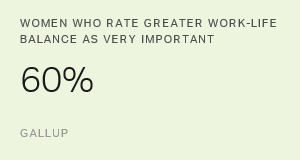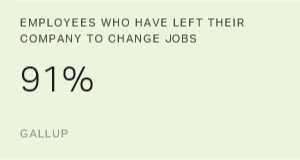Story Highlights
- Staying with a company just for paychecks and benefits isn't appealing
- Important in a job search: fit, flexibility and stability
- Women want their work to matter and to have meaning
For many women, the idea of staying with a company for a long time simply because it provides a paycheck and benefits is unrealistic and unappealing.
In Gallup's latest report, Women in America: Work and Life Well-Lived, research shows that while income is important, women want more out of a job. They are consumers of the workplace and will shop around for the role that best fits them and their lives. Women have to want what organizations are selling.
More than ever, employers need to know and act on the factors that make their company appealing to women. They have to make it easy for prospects to choose them over the competition.
Fit, Flexibility and Stability Are Most Important in a Job Search
Gallup asked U.S. workers who were considering a job change or who had recently switched employers to indicate how important particular factors are in deciding to take a job with a different company. Female and male employees largely value the same factors in a new employer, but women are more likely than men to rate them as "very important."
When considering a new job, women place the highest importance on:
-
the ability to do what they do best
-
greater work-life balance and better personal well-being
-
greater stability and job security
Ability to do what they do best. Two-thirds of female employees believe it is "very important" to find a job that allows them to do what they do best. In comparison, 55% of male employees believe this factor is "very important" in a job.
Employees do their best in roles that enable them to use and integrate their talents (their natural capacity for excellence), skills (what they can do) and knowledge (what they know). Essentially, organizations can empower employees to do their best by matching the right person with the right role.
When employees are a mismatch for their role, they can become bored and restless or struggle to succeed. They might feel like their days -- even their careers -- are wasted, along with their sense of purpose. For women, having a job that enables them to make the most of their natural selves along with their knowledge and skills is most important.
Work-life balance and personal well-being. Women value finding a job that enables them to have greater work-life balance and better personal well-being. It's in this area that Gallup discovered the biggest gap between what male and female employees look for in a role. Sixty percent of women rate greater work-life balance and better personal well-being as a "very important" attribute in a new job, compared with 48% of men who say the same.
Work-life balance and personal well-being have different meanings for different women, but they often pertain to family-friendly policies and flexible scheduling. For working mothers or women who plan to become mothers, a job with a strict 8 a.m. to 5 p.m. schedule is rarely attractive or practical. Companies with rigid work environments or that fail to treat their employees as people are a poor fit for most working women or for women who want to re-enter the workforce.
But work-life balance and personal well-being are about more than flexibility. They encompass all of the components that go into a life well-lived. Many women have a holistic view of life and work and look for employers that do too. They are drawn to companies that encourage, support and empower them as people -- not companies that see them as just workers.
Stability and job security. Roughly half of women (52%) and men (50%) view greater job stability and security as "very important" in a new job.
Women are the primary or equal breadwinners in many American households. The U.S. Census Bureau reports that 9% of working women earn at least $30,000 more than their husbands and that 25% of couples have earnings within $4,999 of each other. A large contingent of working women are also the sole breadwinners for their families. Of the 12 million single-parent families in the U.S., single mothers are the heads of 80% of these households.
Although the economy and job market have improved since the Great Recession, women who were affected by the downturn may still feel as though they are on shaky ground. And for women who shoulder some -- or all -- of the financial burden for their families, it may not be the nation's troubled economic past, but rather the reality of getting by in the present, that is their biggest concern. Women want to know that their company and job are stable because their livelihoods and their families depend on it.
Purpose and Purse
Naturally, pay also plays a part in an employee's decision-making process. Thirty-nine percent of women consider an increase in income to be "very important" when switching jobs. Though pay does matter to women, it is less important to them than fit to the role, the ability to integrate work and home, and having a job they can depend on. Across all the factors that go into deciding to take a new job, increased income is the only one that is more important to male employees than to female employees: 43% "very important" for men versus 39% "very important" for women.
The company itself also plays a part in a woman's decision to take a new role. When considering a job move, 39% of women say the reputation or brand of the company is "very important" to them. A somewhat smaller percentage of women (32%) say the same about the company's cause. For 33% of men, the company's brand is "very important," but only 22% feel the same about the company's cause.
Women want their work to matter and to have meaning. This mentality pushes them to choose jobs that focus on their talents and what they do best, but it also motivates them to choose companies that stand for something or have a great reputation. A company's DNA matters to women, and it is a factor in their job choices. Companies must consider their employee value proposition, employment brand, and overall mission and purpose when they construct their attraction and recruitment strategies.
Learn more about what it takes to attract, engage and retain a gender-diverse workforce. Download Women in America: Work and Life Well-Lived.



